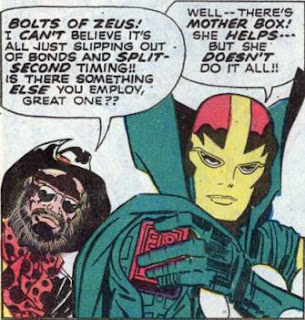My wife Roonina and our son Muttley and I went down to Roonina’s folks’ for Thanksgiving and we were joined there by Roonina’s brother. The traffic on I-95 sucked about as much as you’d imagine, compounded by some seriously foggy weather that morning, but once we arrived at the grandparents’ house all was well. Muttley napped in the car all the way down and was in a good mood all afternoon, due in no small part to the layout of the new environs. Our townhouse is very narrow, which limits Muttley’s running to straight lines from the front of the house to the back; Grandma and Grandpa’s, on the other hand, has a foyer which gives on a hall to the kitchen straight ahead and a doorway to the living room to the right, and the living room also has an entrance to the kitchen, so the hall, kitchen and living room form a ring around the main staircase. So Muttley ran around and around in circles and laughed his round little head off. He also discovered that when he laughed, we laughed, so he actually started fake-laughing, which did in fact succeed in making us laugh some more because it was terribly cute and unexpected. This particular feedback loop went on for hours. Eventually we sat down to dinner, which was less fun for Muttley as he really wasn’t into any of the food on the table. The grown-ups were more than satisfied, as the Thanksgiving menu hit every item on the traditional checklist – turkey, sweet potatoes, green bean casserole, stuffing, pumpkin pie – plus some extra favorites like Grandma’s corn pudding and Roonina’s macaroni and cheese. At some point someone observed that there were no mashed potatoes on hand, but they weren’t missed as much as you might think. Even on the high holy day of overeating, there’s only so many carbs one can take.
After dinner we managed to get Muttley to bed before the kickoff of the Giants-Broncos game, but of course it was all downhill from there. I thought that was a game the Giants had an excellent chance of winning, so it was especially irksome to see them take such a drubbing, failing to score a single touchdown and giving up gobs of points to a mediocre Denver team. When the Giants beat the Falcons last Sunday I thought they had the wherewithal to shake off the losing skid and run to the playoffs; after the Turkey Day debacle, I don’t know what to think.
But there was little time to lament the lackluster performance of professional athletes who happen to play their home games in the state where my parents decided I would spend my formative years, as on Friday we had to get home (by way of the home of a cousin of Grandpa’s, which was a lovely but uneventful visit) in time to meet my Very Little Bro, who was driving down for the weekend. We succeeded – Friday clearly was the best day of the holiday-half-week to be on the highway – and got Muttley bedded down before ordering a couple of pizzas and watching the J.J. Abrams Star Trek reboot flick. I will probably post about that movie at length in the future but suffice to say we all thought that it was totally righteous.
The reason Very Little Bro came all the way down to Virginia was because our mother was coming to visit for a week starting on Saturday. Mom moved out to New Mexico a few years ago and she can’t come east terribly often, but she came for close to a month when Muttley was born (technically two months after Muttley was born, when Roonina had to go back to work and Muttley was still too tiny for daycare) and hadn’t been back since. The week after Thanksgiving worked out well for her this year, so we booked her a flight and I invited both my brothers to come down while she was in town. The big upshot of this is that we (Roonina, Very Little Bro and I) spent all of Saturday morning cleaning the house in anticipation of her arrival. If I were a much better person the house would have somehow gotten cleaned Wednesday night or something, so that we could leave for Thanksgiving, come back and have my brother arrive at an already clean house, but clearly that is an area where I have room for improvement. The Saturday morning cleaning was further complicated by the necessity of organizing the basement room which is the de facto guest room due to its large sleeper futon. We’ve been using that room as a packing/staging area as well in advance of the big move, so Very Little Bro got drafted into helping me pack about half the contents of the pirate bar so that I could start stacking packed boxes behind the pirate bar and clear some actual floor space.
(Note: if you have ever dreamed of setting up a moderately serviceable bar in your home, I strongly recommend doing so in a home where you plan to reside for several decades, if not indefinitely. Once you have stocked a bar with bottles of all varieties of liquor and various mixers, and acquired glassware from shot glasses to highballs to margarita glasses, and been birthday- and xmas-gifted with shakers and stirrers and ice tongs and sundry other knickknacks, it is a soul-crushing beeyotch to have to pack up all of that fragile crap and move it somewhere.)

Mom landed more or less on time and Little Bro and his fiancée made it to town much later that evening (Saturday on the highways was hellish) so we had a nice but brief visit on Saturday night followed up by a harrowing night of Muttley not sleeping and generally being (and making his parents) miserable. I did go to the Motrin a bit sooner on this particular adventure, but I still ended up (at Roonina’s wise suggestion) driving Muttley around at 1:30 a.m. so that the high-speed motion of the car could lull him to sleep. (No highway traffic at that hour, at least.)
In the light of day Sunday morning we could see the indisputable evidence of yet another ear infection afflicting Muttley … gack. I’m starting to resign myself to the probability that he will need his adenoids taken out sooner than later, which is one of those things where on the one hand it’s a routine operation and I am a staunch believer in western medicine and professional advice of doctors and whatnot, and on the other hand just hurts my heart because it entails thinking of my beloved little guy going under the knife. So in addition to the resignation, part of me is keeping my fingers crossed that maybe this will actually be the last ear infection he ever gets in his life and the adenoidectomy issue will be moot.
It’s interesting, and comforting, to have the whole family together for a few days, though. Roonina and I were explaining to my brothers and soon-sister-in-law that Muttley is just the kind of kid who never just gets a cold, they all end up as ear infections. And my mother pointed out that Very Little Bro never just got colds either; he always got full-blown bronchitis. Very Little Bro is now 22 and shows no adverse effects of childhood illness. So life is a circle and inter-generational support is a constant and that’s all good. Fortunately the discussion of Muttley’s ear infections was largely academic because he certainly wasn’t acting like a sick kid, since he had a whole new audience to entertain. So most of Sunday was spent splitting attention between football and Muttley and discussing Star Trek (since we had all, as it turned out, seen the reboot relatively recently) and reminiscing about me and Little Bro’s misspent, heavily-HBO-influenced youth.
Feast #2 was a semi-impromptu engagement celebration for Little Bro and his fiancée, much-delayed from the actual proposal by the fact that far too many miles separate our places of residence and we hadn’t gotten everyone together before this weekend. It was certainly fewer courses and dishes than Thanksgiving but we made them count: steaks (filets and ribeyes), twice-baked potatoes, broccoli and asparagus, followed by champagne and Boston crème pie cake. Or, as we condensed the idea to a catchy title, Sunday Night Steak-n-Cake. The menu was Roonina’s brainstorm and just one more piece of evidence that I have married a genius. The fact that I got to do some serious late-season grilling as my contribution to the preparation was a nice bonus.
After the serious chowing down and toasting of the happy couple, the only thing left to do to finish the weekend was watch the Ravens-Steelers game, which, for those of you keeping score, was one of heavy emotional investment for Roonina (who loves the Steelers so much that she might as well be a member of the team-owning Rooney family, hence that particular silly sobriquet) because it is an intra-divisional rivalry with playoff implications. Unfortunately, with bellies full of beef and tubers and sparkling wine and chocolate icing, it was challenging to stay up until the end of the game. Roonina drifted off sometime in the fourth quarter, and maybe that’s just as well as the game went into OT but the Steelers’ ridiculously inexperienced fill-in quarterback gave up an interception that set up the Ravens’ game-winning score.
All in all, though, of the three F’s two were really, really good all extended-weekend long, and I will take that and be very satisfied. And now everyone is caught up and I can get into some really geeky explorations later this week.















